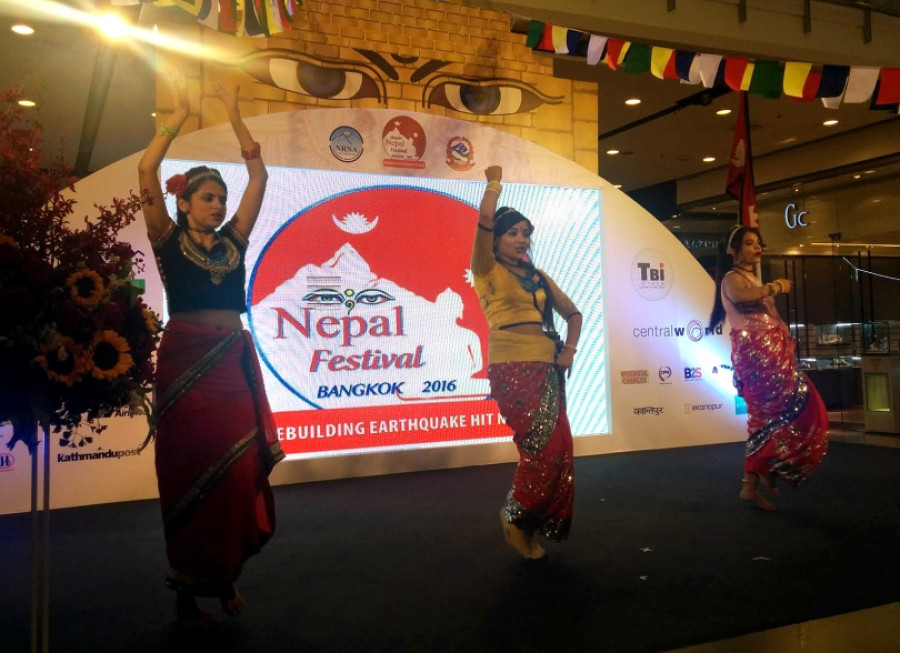Miscellaneous
Nepal Festival in Bangkok commemorates year after tragic earthquake
Nepali citizens look forward to Thai generosity to alleviate the fallout from the tragic earthquake that struck the country one year ago today, leaving the culturally sophisticated country with many casualties and a staggering number of people whose homes were destroyed.
Asia News Network
Nepali citizens look forward to Thai generosity to alleviate the fallout from the tragic earthquake that struck the country one year ago today, leaving the culturally sophisticated country with many casualties and a staggering number of people whose homes were destroyed.
To promote awareness about the catastrophe, a Nepal Festival has been held at CentralWorld in Bangkok over the past four days, welcoming passers-by to authentic Nepalese shops and performances, plus a photo exhibition showcasing the country's stunning Himalayan mountains.
The event, jointly organised by the Embassy of Nepal and the Non-Resident Nepali Association (NRNA) in Thailand, graces the department store's first floor with music from the sita (a Nepalese string instrument), played on stage as dancers flow with traditional movements while the audience claps their hands
The event includes talks by people familiar with the country, including Ekkawit Sudanich, who was inspired by the earthquake to write a book named "This Way to Himalaya".
Ekkawit said the experiences occurred when he accompanied his wife, Jiraporn Sudanich, to Nepal, where she served as a counsellor for the Thai embassy.
"I had experienced some earthquakes before, but this one was a real shock to me," Ekkawit said. "It felt like a giant wave stormed under the land. All of a sudden, the whole of Kathmandu looked like it had been struck brutally by massive bombs."
As a couple associated with the diplomatic mission, Ekkawit and his wife were keen to provide aid to more than 100 Thai people affected. He said they had struggled to fulfil their responsibility to provide food and shelter.
"Most of the shops were closed because there were a lot of street thieves. We even had to ask police officers to guard the embassy's water-delivery truck, otherwise it would definitely have been robbed."
Thai commercial airlines also had difficulty landing at the airport, which was at capacity with Indian airlines, he said.
"Thai people couldn't have been any more relieved than when the Royal Thai Air Force's C-130 eventually arrived in Kathmandu," he said. "They knew the plane was carrier-based but no one minded at that point. They just wanted to return home."
But Ekkawit's attachment to Nepal did not fade after leaving. He resigned from his job as a brewer to become a freelance writer, donating proceeds from his book to the Nepal Red Cross Society and the Royal Thai Monastery in the pilgrimage site of Lumbini. He also runs a solar power company, and hoped to sell affordable solar panels in the country, he said.
Another Thai who appeared on stage was Akkavich Harnnavachok, who was a volunteer doctor in the aftermath of the quake. His medical team arrived in Nepal on May 27, 15 days after a second earthquake had struck.
Akkavich said he had been dedicated to helping people despite the language barrier. Nepalese Buddhist monks, many of whom had studied in Thailand, also came to help with interpretation, he said.
Akkavich said it was an overwhelming experience, as each medical team took turns volunteering in five-day shifts.
Audiences at the festival can also enjoy shops selling handmade products ranging from jewellery, home decorations and even pencils made from old newspaper and Nepalese lokta paper.
The idea behind the pencils was initiated by Sudha Basnet, who said her project aims to reduce paper waste. "It is our small effort to conserve nature by saving trees," she said.
Her company, Women's Dreams Paper Pencil Industry, does what it says - helping to employ Nepalese women to make the pencils. Moreover, 20 per cent of sales are distributed to people hit by the disaster.
Sudha's shop is just one venue at the event seeking to raise funds for quake victims. Friend Handicrafts, which sells wool products produced by traditional methods, also distributes proceeds to earthquake victims, staff said.
The NRNA also sells T-shirts and caps to collect money for the Nepalese government, giving away 'sanctified soil' collected from Lumbini, the reputed birthplace of Buddha, to attendees who may offer donations in return.
There are also food shops, booths from airlines and travelling agencies, and a poster board adorned with photos and kind words written to the Nepalese by people who attend the event.
The Nepal Festival ends today with a candlelight vigil to commemorate the tragedy, which along with four after-shocks left at least 8,857 dead, more than 20,000 injured and 3.5 million homeless.




 17.9°C Kathmandu
17.9°C Kathmandu










